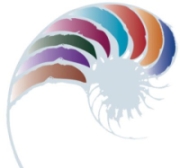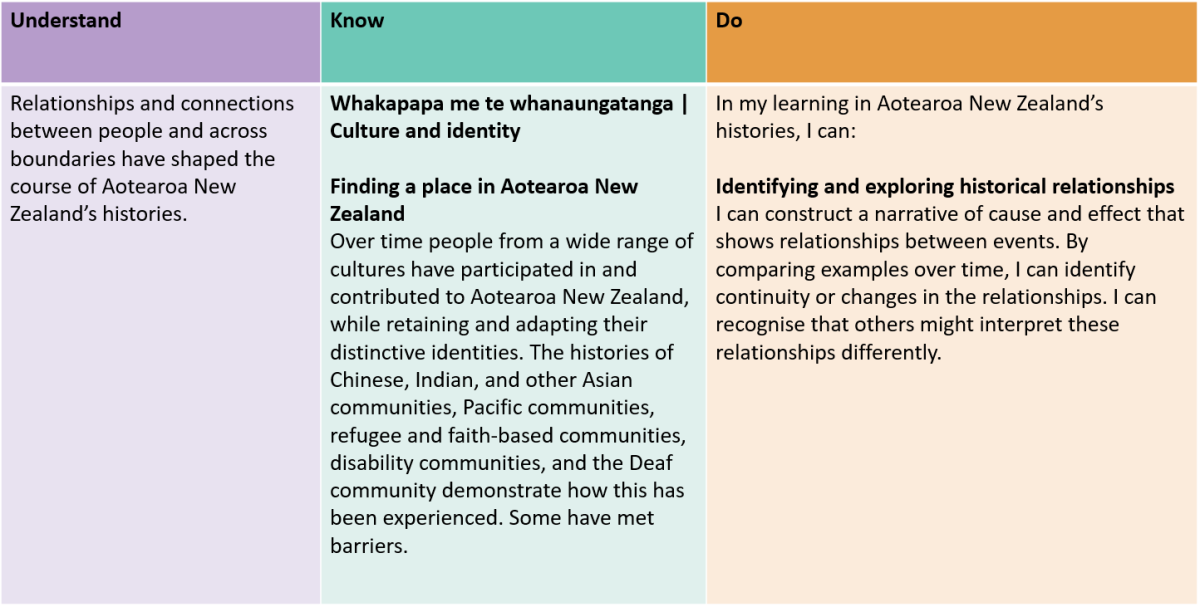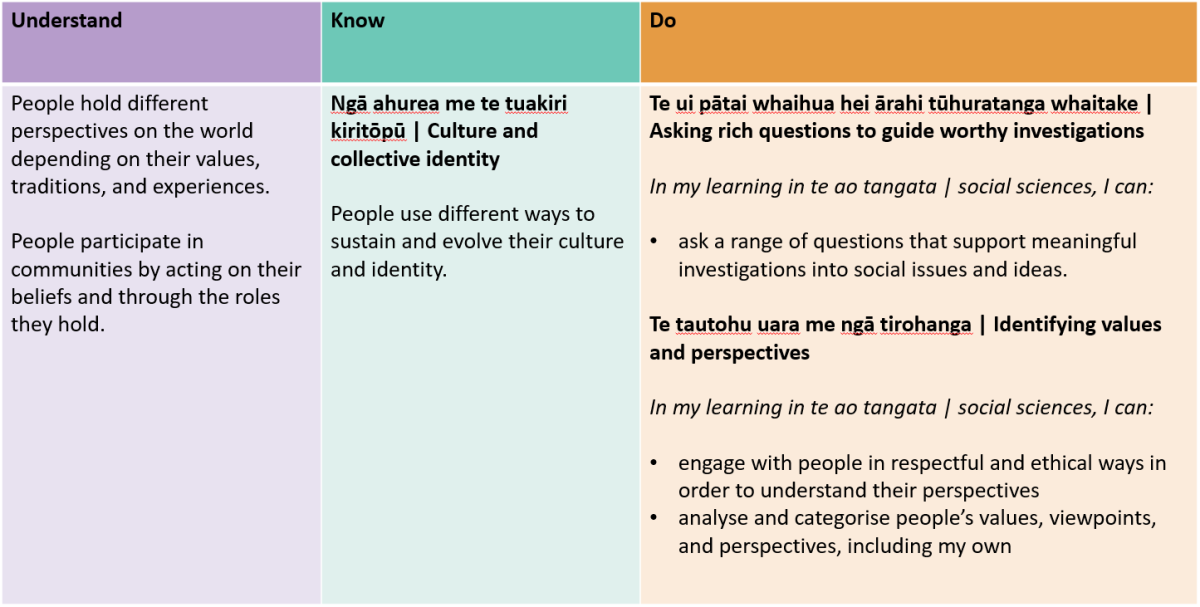<- Homepage: Showcasing our Pacific cultures
This guide for New Zealand educators outlines key areas of the New Zealand Curriculum and Tapasā related to the Showcasing our Pacific cultures virtual field trip. It also offers a range of useful links, suggested activities and a suggested approach to support student-led inquiry.
On this page:
Curriculum
This field trip promotes learning about four key areas, which align with the Tapasā and Te Mātaiaho - The Refreshed New Zealand Curriculum frameworks:
-
Culture and identity: This area focuses on helping students develop an understanding of their own cultural identity and the cultural identities of others and aligns with the Tapasā framework, which emphasises the importance of teachers being culturally aware and responsive.
-
Cultural diversity: This area explores the diversity of cultures in Aotearoa and the world, and how this diversity enriches our society. This aligns with the New Zealand Curriculum, which encourages students to develop a greater understanding of the world around them.
-
Performance and presentation: This area focuses on developing students' skills in performance and presentation, such as music, dance, and public speaking. This aligns with the New Zealand Curriculum, which emphasises the importance of students being confident and competent communicators.
-
Social justice and equity: This area explores issues related to social justice and equity, and encourages students to take action to promote a fair and just society. This aligns with the Aotearoa New Zealand histories learning area, which emphasises the importance of social equity.
Utilise this field trip to help your students develop a deeper understanding and appreciation of cultural diversity, while also meeting the requirements of the Tapasā and Te Mātaiaho, including Aotearoa New Zealand histories learning.
Tapasā
This field trip supports the Tapasā–Cultural competencies framework for teachers of Pacific learners, including turu (competencies) for teachers to develop. For example:
-
Turu 1: Identities, languages and cultures (1.9, 1.10)
-
Turu 2: Collaborative and respectful relationships and professional behaviours (2.10, 2.12)
-
Turu 3: Effective pedagogies for Pacific learners (3.9)
New Zealand Curriculum (NZC)

This virtual field trip follows a cross-curricular approach to teaching and learning, based on the 2007 New Zealand Curriculum and the Refreshed New Zealand Curriculum (Te Mātaiaho). While it's most suitable for certain learning areas, year groups, and progressions, it's not limited to them. Choose one or more learning areas, concepts, and progress outcomes to suit your students' interests and learning needs.
This field trip can be used as a starting point for multiple areas of inquiry. Look for ways to connect this learning experience with other topics that are relevant to your ākonga on a national or local level.
Aotearoa New Zealand's histories
Progress outcome by the end of year 8:

Key questions:
-
How and why have expressions of identity and belonging changed for different groups of people as they have participated in society?
-
How has their participation helped form Aotearoa New Zealand?
Learning experiences:
Explore examples of:
-
experiences of different communities over time (for example, of early British, Irish, Chinese, and Indian migrant communities; of Pacific and Asian communities and communities from continental Europe, the Americas, and the African continent; of women and children; of the Deaf community and refugee, faith-based, disability, and minority communities)
-
forms of participation and contribution – for example, sociocultural (for example, through new ideas, new foods and cuisine, language and religious diversity; the creation of new arts, music, and fashions; sporting achievements and community organisations; greater global interconnectedness).
Te Ao Tangata | Social sciences
Progress outcome by the end of year 8:

The Arts (NZC 2007)
Dance (Level 3)
Understanding dance in context
-
Explore and describe dances from a variety of cultures.
Communicating and interpreting
-
Use the elements of dance to describe dance movements and respond to dances from a variety of cultures.
Music (Level 3)
Understanding music – Sound arts in context
-
Identify and describe the characteristics of music associated with a range of sound environments, in relation to historical, social, and cultural contexts.
-
Explore ideas about how music serves a variety of purposes and functions in their lives and in their communities.
Communicating and interpreting
-
Respond to and reflect on live and recorded music.
English (NZC 2007)
Listening, reading and viewing
Ideas: Show a developing understanding of ideas within, across, and beyond texts.
E.g. Indicators at level 3:
-
uses their personal experience and world and literacy knowledge confidently to make meaning from texts
-
makes meaning of increasingly complex texts by identifying main and subsidiary ideas in them
-
starts to make connections by thinking about underlying ideas in and between texts
-
recognises that there may be more than one reading available within a text
-
makes and supports inferences from texts with increasing independence.
The Statement of National Education and Learning Priorities (NELP)
This field trip supports the NELP objectives, priorities and actions, specifically Objective 1: Learners at the centre and Objective 2: Barrier free access.
Explore the NELP objectives, priorities and actions >
Framework and activities
By engaging with Pacific culture through this framework and related activities, tokotaha (students) will have the opportunity to learn about and appreciate the customs and traditions of the Pacific region, and develop a deeper understanding of the cultural diversity that exists within Aotearoa.
The virtual field trip and related activities can support the concepts of:
-
E aoao - by providing opportunities for tokotaha to learn from their peers and cultural experts
-
Le Vā i - by encouraging tokotaha to work collaboratively and build positive relationships with their peers
-
Faka'apa'apa - by offering opportunities for tokotaha to respect and value different cultures and perspectives.
Teacher reflection
Before you start ask yourself the following questions while engaging with the field trip material, adapted from Tapasā:
-
How do your Pacific learners see themselves reflected in the school environment and events?
-
How are you valuing identity, culture, and diversity in your teaching practice?
-
How are you helping your Pacific learners share and celebrate their identity, culture, and what matters most to them and their fanau?
-
How are you engaging with your Pacific fanau and community to share their cultural knowledge and strengths, and build your cultural awareness and understanding?
-
Can you encourage Pacific learners to share their identities, languages, and cultures through music and dance?
-
How are you acknowledging the cultural identities, experiences, and backgrounds of all your tokotaha?
-
What do your tokotaha tell you about themselves and what they value?
-
How do they express themselves? How do they feel about themselves?
Refer to the Tapasā website for more information.
Provide a framework
To encourage student-led learning, provide a framework that supports critical thinking, problem-solving, collaboration, and self-management skills, ownership of learning, and a sense of agency and independence. For example, tokotaha can:
-
identify a meaningful and authentic problem or question that they are interested in exploring.
-
explore the resources provided in the field trip and beyond, including connecting with experts, watching videos, and taking a virtual tour using Google Earth for Web.
-
use prompts such as "What do you see?" "What do you think?" "What did you wonder about?" "What questions do you have?" and "What do you want to find out more about?" to guide their inquiry and help them identify their goals.
-
plan, connect, and create content or solutions based on their inquiry and goals.
-
plan how to share their content, e.g. by showcasing their work at a local library, community centre, or hosting a community event, as well as sharing their work on digital platforms and reaching out to local media outlets for coverage.
Suggested learning sequence
Use the following suggested activities to help ākonga engage with this virtual field trip. For example:
Before the trip tokotaha can read the discover more pages to:
-
generate questions based on their knowledge of Pacific customs and traditions, the theme of the festival MANA MOTUHAKE–Creating One's Own Destiny, or something similar.
During the trip tokotaha can watch the videos and explore the Google Earth tour to:
-
explore ways in which the Polyfest festival promotes cultural revitalisation and resilience for Pacific communities
-
discuss how Polyfest’s theme is enacted or highlighted before and during Polyfest
-
take notes, gather information, and develop their questions about the different cultural groups, their culture, values, and traditions.
After the trip tokotaha can:
-
reflect on what they have learned and how it has deepened their understanding of the cultures represented within the field trip and at Polyfest
-
use their notes and information gathered to develop and answer inquiry questions.
Self-assessment
Encourage your tokotaha to complete both the online pre-assessment and post-assessment forms for this field trip. If just some of your tokotaha have filled them out, or if they have submitted only one self-assessment instead of both, that's perfectly fine. Once completed, email help@learnz.org.nz, and we'll extract and send you your class submissions. Before submitting, make sure to review and ensure that any media content, such as images and sound, adhere to appropriate Creative Commons licensing and that any people who are in images and video have given their permission to feature.
Links and resources
-
ASB Polyfest Website - This is the official website for the ASB Polyfest, the largest Polynesian festival in the world. The website provides information about the festival, including the dates, venue, and cultural groups involved.
-
Language, identity and culture – Tapasā, Te Kete Ipurangi. This page explores the importance of valuing and building cultural awareness and identity by selecting the video on this page, and consider the reflective questions for teachers.
-
Being a Pacific learner – Tapasā, Te Kete Ipurangi. This page provides insights into how Pacific learners perceive school and learning, and what they want you to know about their community, for example, Being Tongan and Being Samoan.
-
Laufatu o pese ma siva - Music and dance – Te Whāriki Online. This page gives guidance on how music and dance are an integral part of Pacific culture.
-
Pacific Education Community – Te Kete Ipurangi. This website provides links to resources, research, and examples of practice that teachers and school leaders can use to support and engage with Pacific learners and their families.
-
Samoa Language Week - This page is part of the New Zealand Curriculum website and provides resources and information about Samoa Language Week, an annual event in New Zealand that celebrates the Samoan language and culture. The page includes activities and ideas for teachers and students to engage with the Samoan language and culture.
-
Cook Islands Language Week - Similar to the Samoa Language Week page, this page provides information and resources for Cook Islands Language Week, which celebrates the Cook Islands language and culture. Teachers and students can find activities and ideas to engage with the Cook Islands culture.
-
NZ Music Month - This page provides resources for NZ Music Month, an annual celebration of New Zealand music held in May each year. Teachers and students can find activities and ideas to explore and celebrate the music of New Zealand.
-
South Pacific Beats - This page is part of the Connected Instructional Series and provides a unit of work for Level 3 students on music from the South Pacific. The unit explores the history, culture, and music of the South Pacific through various activities and resources.
-
Dances of Samoa - This page is part of the School Journal Instructional Series and provides a resource for Level 2 students to learn about the traditional dances of Samoa. The resource includes a text for students to read, as well as activities and resources to explore the topic further.



